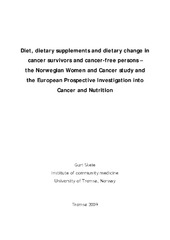Levonorgestrel-releasing intrauterine system use is associated with a decreased risk of ovarian and endometrial cancer, without increased risk of breast cancer. Results from the NOWAC Study
Permanent link
https://hdl.handle.net/10037/14454Date
2018-03-02Type
Journal articleTidsskriftartikkel
Peer reviewed
Author
Jareid, Mie; Thalabard, Jean-Christophe; Aarflot, Morten; Bøvelstad, Hege Marie; Lund, Eiliv; Braaten, TonjeAbstract
Objective: Women with ovarian cancer have poor survival rates, which have proven difficult to improve; therefore primary prevention is important. The levonorgestrel-releasing intrauterine system (LNG-IUS) prevents endometrial cancer, and recent studies suggested that it may also prevent ovarian cancer, but with a concurrent increased risk of breast cancer. We compared adjusted risks of ovarian, endometrial, and breast cancer in ever users and never users of LNG-IUS.
Methods: Our study cohort consisted of 104,318 women from the Norwegian Women and Cancer Study, 9144 of whom were ever users and 95,174 of whom were never users of LNG-IUS. Exposure information was taken from self-administered questionnaires, and cancer cases were identified through linkage to the Cancer Registry of Norway. Relative risks (RRs) with 95% confidence intervals (CIs) were estimated with Poisson regression using robust error estimates.
Results: Median age at inclusion was 52 years and mean follow-up time was 12.5 (standard deviation 3.7) years, for a total of 1,305,435 person-years. Among ever users of LNG-IUS there were 18 cases of epithelial ovarian cancer, 15 cases of endometrial cancer, and 297 cases of breast cancer. When ever users were compared to never users of LNG-IUS, the multivariable RR of ovarian, endometrial, and breast cancer was 0.53 (95% CI: 0.32, 0.88), 0.22 (0.13, 0.40), and 1.03 (0.91, 1.17), respectively.
Conclusion: In this population-based prospective cohort study, ever users of LNG-IUS had a strongly reduced risk of ovarian and endometrial cancer compared to never users, with no increased risk of breast cancer.
Description
Is part of
Jareid, M. (2022). Epithelial ovarian cancer. Population-based cohort studies. The NOWAC Study and Postgenome biobank. (Doctoral thesis). https://hdl.handle.net/10037/26790Publisher
ElsevierCitation
Jareid, M., Thalabard, J.-C., Aarflot, M., Bøvelstad, H., Lund, E. & Braaten, T. (2018). Levonorgestrel-releasing intrauterine system use is associated with a decreased risk of ovarian and endometrial cancer, without increased risk of breast cancer. Results from the NOWAC Study. Gynecologic Oncology, 149(1), 127-132. https://doi.org/10.1016/j.ygyno.2018.02.006Metadata
Show full item recordCollections
Related items
Showing items related by title, author, creator and subject.
-
Adherence to the World Cancer Research Fund/American Institute for Cancer Research cancer prevention recommendations and risk of in situ breast cancer in the European Prospective Investigation into Cancer and Nutrition (EPIC) cohort
Karavasiloglou, Nena; Hüsing, Anika; Masala, Giovanna; van Gils, Carla H.; Fortner, Renée Turzanski; Chang-Claude, Jenny; Huybrechts, Inge; Weiderpass, Elisabete; Gunter, Marc; Arveux, Patrick; Fournier, Agnès; Kvaskoff, Marina; Tjønneland, Anne; Kyrø, Cecilie; Dahm, Christina C.; Vistisen, Helene Tilma; Bakker, Marije F.; Sánchez, María-José; Chirlaque López, María Dolores; Santiuste, Carmen; Ardanaz, Eva; Menéndez, Virginia; Agudo, Antonio; Trichopoulou, Antonia; Karakatsani, Anna; La Vecchia, Carlo; Peppa, Eleni; Palli, Domenico; Agnoli, Claudia; Panico, Salvatore; Tumino, Rosario; Sacerdote, Carlotta; Butt, Salma Tunå; Borgquist, Signe; Skeie, Guri; Schulze, Matthias; Key, Timothy; Khaw, Kay-Tee; Tsilidis, Konstantinos K.; Ellingjord-Dale, Merete; Riboli, Elio; Kaaks, Rudolf; Dossus, Laure; Rohrmann, Sabine; Kühn, Tilman (Journal article; Tidsskriftartikkel; Peer reviewed, 2019-12-02)<i>Background</i> - Even though in situ breast cancer (BCIS) accounts for a large proportion of the breast cancers diagnosed, few studies have investigated potential risk factors for BCIS. Their results suggest that some established risk factors for invasive breast cancer have a similar impact on BCIS risk, but large population-based studies on lifestyle factors and BCIS risk are lacking. Thus, ... -
Diet, dietary supplements and dietary change in cancer survivors and cancer-free persons : the Norwegian Women and Cancer study and the European Prospective Investigation into Cancer and Nutrition
Skeie, Guri (Doctoral thesis; Doktorgradsavhandling, 2009-09-11)This thesis focuses on diet and dietary change in women who have breast or colorectal cancer, compared to cancer-free women in the Norwegian Women and Cancer study (NOWAC; Kvinner og kreft). The use of dietary supplements in the European Prospective Investigation into Cancer and Nutrition (EPIC) is also described. Finally, the association between use of cod liver oil and other supplements and survival ... -
A comprehensive analysis of the androgen receptor gene and risk of breast cancer. Results from the National Cancer Institute Breast and Prostate Cancer Cohort Consortium (BPC3)
Lund, Eiliv; Cox, David G.; Blanché, Hélène; Pearce, Celeste L.; Calle, Eugenia E.; Colditz, Graham A.; Pike, Malcolm C.; Albanes, Demetrius; Allen, Naomi E.; Amiano, Pilar; Berglund, Göran; Boeing, Heiner; Buring, Julie; Burtt, Noel; Canzian, Federico; Chanock, Stephen; Flavel-Chapelon, Françoise; Feigelson, Heather Spencer; Freedman, Matthew; Haiman, Christopher A.; Hankinson, Susan E.; Henderson, Brian E.; Hoover, Robert; Hunter, David J.; Kaaks, Rudolf; Kolonel, Laurence; Kraft, Peter; LeMarchand, Loic; Palli, Domenico; Peeters, Petra H.M.; Riboli, Elio; Stram, Daniel O.; Thun, Michael; Tjönneland, Anne; Trichopoulos, Dimitrios; Yeager, Meredith (Journal article; Tidsskriftartikkel; Peer reviewed, 2006-09-20)Introduction Androgens have been hypothesised to influence risk of breast cancer through several possible mechanisms, including their conversion to estradiol or their binding to the oestrogen receptor and/or androgen receptor (AR) in the breast. Here, we report on the results of a large and comprehensive study of the association between genetic variation in the AR gene and risk of breast cancer ...


 English
English norsk
norsk


